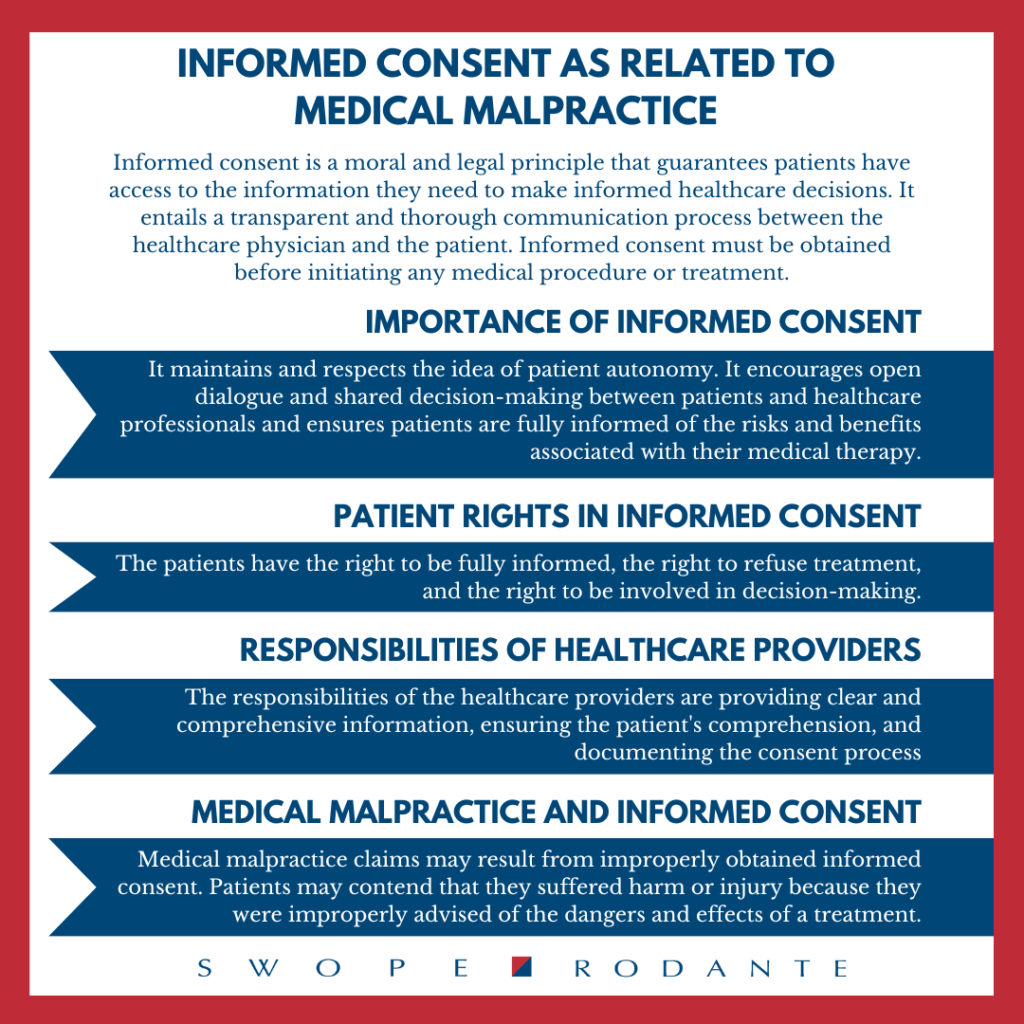In the realm of healthcare, informed consent of the patient is a fundamental principle that upholds patient autonomy and respects their rights. When medical professionals fail to obtain proper informed consent, it can lead to serious legal and ethical implications, potentially resulting in medical malpractice claims. As a leading medical malpractice law firm in Tampa, Florida, Swope, Rodante understands the importance of informed consent in protecting patients’ rights. We also believe it is important Floridians understand the concept of informed consent, its significance, as well as the rights and responsibilities of both patients and healthcare providers. By understanding these principles Floridians will be better positioned to protect their own health and preserve their rights in the event there is a problem.
Defining Informed Consent as Related to Medical Malpractice
Informed consent is a legal and ethical concept that ensures patients have the necessary information to make knowledgeable decisions about their healthcare. It involves a clear and comprehensive communication process between the healthcare provider and the patient, explaining the proposed treatment, potential risks and benefits, alternative options, and any potential consequences of not proceeding with the recommended treatment. Informed consent must be obtained before initiating any medical procedure or treatment. (Source: American Medical Association (AMA))
Importance of Informed Consent
Informed consent serves several crucial purposes. Firstly, it respects and upholds the principle of patient autonomy, allowing individuals to make informed decisions about their own bodies and healthcare. Secondly, it fosters a trusting and collaborative relationship between patients and healthcare providers, promoting open communication and shared decision-making. Furthermore, informed consent helps protect patients from potential harm and ensures they are fully aware of the risks and benefits associated with their medical treatment.
Patient Rights in Informed Consent:
Patients have certain rights when it comes to informed consent. These include:
- The right to be fully informed: Patients have the right to receive complete and accurate information about their diagnosis, recommended treatment, potential risks, benefits, and available alternatives. They should have the opportunity to ask questions and seek clarification.
- The right to refuse treatment: Patients have the right to decline or refuse any treatment, even if it is recommended by their healthcare provider. It is essential that they understand the potential consequences and risks of refusing treatment.
- The right to be involved in decision-making: Patients have the right to actively participate in decisions about their healthcare. They should be able to discuss treatment options, express their preferences, and have their concerns considered.
Responsibilities of Healthcare Providers
Healthcare providers also have responsibilities when it comes to obtaining informed consent. These include:
- Providing clear and comprehensive information: Healthcare providers should explain the proposed treatment, risks, benefits, alternatives, and potential outcomes in a manner that the patient can understand. They should address any questions or concerns raised by the patient.
- Ensuring patient comprehension: Healthcare providers should assess the patient’s understanding of the information provided and confirm that they comprehend the implications and consequences of the proposed treatment.
- Documenting the consent process: It is crucial for healthcare providers to document the informed consent process, including discussions with the patient, the information provided, the patient’s understanding, and any consent obtained. This documentation serves as legal protection and helps ensure accountability.
Medical Malpractice and Informed Consent
Failure to obtain proper informed consent can potentially lead to medical malpractice claims. Patients may argue that they were not adequately informed of the risks and consequences of a treatment, which resulted in harm or injury. (Source: University of Florida, Risk Rx) In such cases, it is important for patients to consult with experienced medical malpractice attorneys, like ours at Swope, Rodante P.A., who can assess the details of the case, gather evidence, and advocate for their rights.
I consent is a critical component of the patient-provider relationship, safeguarding patient autonomy and promoting shared decision-making. Understanding the rights and responsibilities surrounding informed consent is essential for both patients and healthcare providers. In the context of medical malpractice, proper adherence to the principles of informed consent is crucial to protect patients’ rights and ensure ethical and accountable healthcare practices.














